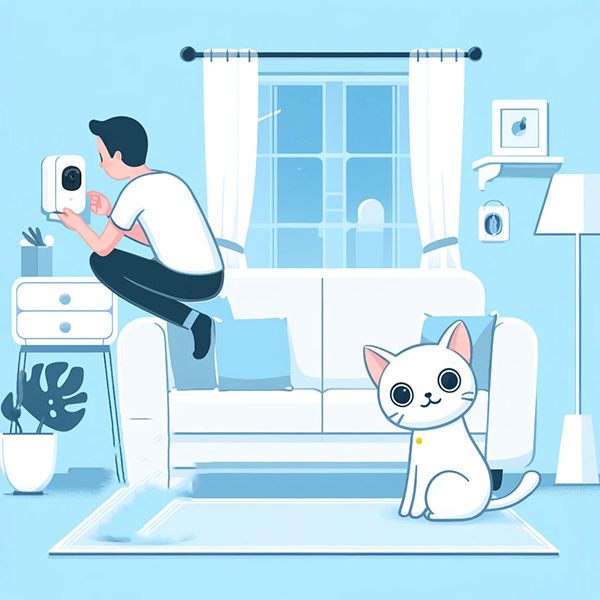Going away on vacation can be a source of stress not only for you but also for your furry friend. Cats are creatures of habit, and disrupting their routine in your absence requires careful planning to ensure their comfort and safety. Whether you choose to hire a cat sitter, utilize a professional boarding service, or leave them with a trusted friend or family member, preparation is key.
In this blog post, we will explore effective strategies for each option, helping you make informed decisions on how best to care for your feline companion while you're away. From maintaining their routine and diet to ensuring they have familiar comforts and emergency plans, we'll cover all the essentials to keep your cat happy and stress-free during your travels.
3 Cat Care Options
Hiring a Cat Sitter/ House Sitter
Hiring a cat sitter or house sitter can ensure your cat remains comfortable in their home environment while you're away. A good sitter will maintain your pet’s routine, offer companionship, and manage feeding and cleanliness. If you have a kitten younger than four months, having a cat sitter can be ideal, as they should not be left on their own for more than four hours and will require more attention.
The advantages of using a cat sitter include keeping your cat in a familiar environment, which reduces stress associated with new surroundings. Personalized care from a sitter ensures that your cat’s specific needs and routines are maintained, and someone regularly visiting your home can also deter potential burglars. In addition, it is more cost-efficient if you have more than one kitty than if you use a boarding facility.
On the downside, professional cat sitters can be expensive, with costs varying widely but generally ranging from $15 to $30 per visit. There's also the potential issue of stranger anxiety; some cats might not adjust well to a new person, and there are always concerns about the reliability of the individual you're entrusting with your home and pet.
When searching for the right cat sitter, start early to have ample time to vet potential candidates. Seek recommendations from friends, family, or your vet, and ensure any sitter you consider has good reviews and a clean record. Organize a meet-and-greet session between the sitter and your cat to witness their interaction. Be clear about your expectations and emergency procedures, including how many visits you expect per day and what each visit should entail.
Professional Boarding Facility
If a professional sitter isn't an option, boarding your cat at a reputable facility is another route. Look for a place that offers cat-friendly accommodations away from dogs and provides regular human interaction.
Using boarding facilities for your cat while on vacation can offer both advantages and challenges. The advantages include professional care from trained staff who can manage dietary and medical needs, a safe and secure environment designed to minimize risks, and potential socialization opportunities for cats that enjoy the presence of other animals.
However, there are notable drawbacks. Cats can experience significant stress due to changes in their environment and unfamiliar smells. While young cats can adapt to change more easily, senior cats will have a much harder time. Depending on the facility and their setup, your cat may not have a calming and relaxing environments it's used to. The cost of boarding can also be steep, ranging from $15 to $50 per day, and there's an increased risk of illness from exposure to other animals.
To find a suitable facility, thorough research is essential. Look for highly recommended places with positive reviews, and visit them to inspect their cleanliness, check out the kitty's kennel size, safety features, and observe staff interactions with the animals. Ask detailed questions about their emergency procedures, staff qualifications, and daily routines. Consider a trial run with a short stay to see how your cat adjusts, which can offer insights into how they might cope during a longer separation. This approach ensures the facility meets your standards and helps in making your cat's stay as comfortable as possible.
Staying with a Friend or Family Member
This can be a good choice if your cat is familiar with the person and their home, which can minimize the stress associated with your absence. Another option is you can request a friend or family member to visit your home instead. Leaving your cat with friends or family while on vacation is a familiar and often comforting option of the three.
One major advantage is your cat's familiarity with these individuals or their homes, which can significantly ease the stress of your absence. Additionally, this arrangement often allows for more personalized care and attention to your cat’s specific routines and needs, and it is generally a more economical choice than professional boarding.
However, there are drawbacks to consider. The standard of care might not match that of a professional, as friends or family may not fully understand all the nuances of cat care, including diet and behavioral management. Also, if the home environment isn’t cat-friendly or there are other pets and children, it could lead to additional stress for your cat.
Furthermore, entrusting your pet’s care to friends or family can strain relationships, especially if any issues arise during your absence. To minimize potential problems, it is crucial to provide detailed instructions regarding your cat’s habits and care and ensure emergency contacts are readily available.
Tips for Leaving Cats at Home While On Vacation
Preparation and Safety

Preparing and safety are paramount to ensure your pet's well-being when planning to leave your cat alone while on vacation. Start by securing any potential hazards in your home, such as toxic plants, loose wires, and small objects that could be swallowed. Ensure that all windows and doors are tightly secured to avoid any possibility of escapes.
As part of preparing your home, ensure your cat has access to fresh water and food. Think about using an automatic feeder and a water fountain to uphold a consistent feeding schedule. It's also wise to leave detailed care instructions for a pet sitter, including feeding routines, favorite hiding spots, behavioral quirks, your vet's contact information, and an emergency contact. Implementing these measures contributes to establishing a secure and comfortable environment for your cat during your absence.
Environmental Enrichment
When planning to leave your cat while on vacation, providing environmental enrichment is essential to ensure they remain engaged and stress-free in your absence. Enriching your cat’s environment involves stimulating activities catering to their natural behaviors. This includes having a variety of interactive toys, like slow puzzle feeders, which challenge them and keep their minds active.
Consider adding new scratching posts or cat trees to encourage climbing and scratching, activities that cats find comforting and natural. Additionally, ensuring they have access to window perches can allow them to view the outdoors, which is mentally stimulating. Arranging these elements in your home will help maintain your cat’s physical and mental well-being, keeping them entertained and reducing potential anxiety while you're away.
Monitoring and Interaction

Monitoring and interaction are critical in ensuring cats' well-being when they are left alone while on vacation. Setting up a pet camera system is highly beneficial as it allows you to observe and interact with your cat remotely. Many modern pet cameras offer features like two-way audio, which lets you hear and speak to your cat, providing reassurance and maintaining a bond despite the physical distance.
Additionally, scheduling daily check-ins with a cat sitter or a trusted friend can ensure your cat receives the necessary social interaction and care. These visits can help mitigate feelings of loneliness and allow your cat’s caretaker to monitor their eating habits, behavior, and use of the litter box, addressing any issues promptly. This combination of technological monitoring and personal interaction helps keep your cat happy and healthy while you’re away.
Routine and Familiarity
Establishing a regular routine and maintaining a familiar environment is essential for reducing cat stress while on vacation. Cats are creatures of habit and greatly depend on a predictable daily schedule for feeding, playing, and resting. Any significant disruptions can lead to anxiety and stress-related behaviors.
To support your cat in your absence, ensure their daily routine remains unchanged. If someone is caring for your cat, provide them with detailed instructions about your cat’s typical schedule, including feeding times, preferred foods, and usual play activities. Keep your cat's environment as unchanged as possible—leave their bedding, toys, and other personal items in their usual places to provide comfort and a sense of security. This familiarity will help calm your cat and relax while you’re away.
Tips for Leaving Your Cats For Vacation In a New Environment
Acclimation

Acclimating your cat to a new environment while on vacation is key to their comfort and safety. Start by visiting the new space with your cat before your trip, allowing them to explore under your supervision. Take familiar items such as their bed, toys, and even a blanket with your scent. Make sure the area is safe and secure, devoid of any hazards that might pose a risk to your cat. Gradually extending their time spent in the new environment can assist in smoothing their transition.
Familiar Items
Bringing familiar items can significantly reduce your cat's stress when leaving it in a new environment while on vacation. Include their preferred bed, toys, blanket, or an item of clothing that carries the scent of home in your packing. These familiar scents provide comfort and a sense of security, helping your cat feel more at ease in unfamiliar surroundings. This simple act can make a big difference in maintaining your cat’s happiness and well-being during your absence.
Monitor Behavior

Monitoring your cat’s behavior in a new environment is crucial to ensure it is adjusting well. Watch for indications of stress, such as hiding, decreased appetite, or alterations in litter box behavior. Consider additional comfort measures or adjustments to their space if you notice any concerning behaviors. Regular updates from a caretaker or using a pet camera can help you stay informed and responsive to your cat’s needs while you're away.
Consistent Diet
Maintaining a consistent diet is crucial when leaving your cat in a new environment while on vacation. Abrupt changes in diet can lead to digestive disturbances and contribute to stress. Ensure your cat continues to receive the same brand and type of food they are used to. Provide detailed feeding instructions to the caretaker, including portion sizes and feeding times, to help maintain routine and minimize discomfort for your cat during your absence.
You can try an automatic feeder to ensure your cats are fed regularly. However, keep in mind that an automatic feeder doesn't replace a pet sitter or a caregiver while you are away.
Clear Instructions

When leaving your cat in a new environment while on vacation, it is essential to provide clear instructions to the caretaker. Detail your cat's daily routine, including what time your cat eats, dietary preferences, medication schedules, if applicable, and favorite activities.
If your furry companion is taking any medication, ensure you leave detailed instructions on how to administer the cat's medications properly. Also, include guidance on how to handle any behavioral quirks or potential emergencies. Comprehensive instructions help ensure your cat's needs are met consistently and can prevent misunderstandings, ensuring a smoother experience for both your cat and its caretaker.
Emergency Info
When leaving your cat in a new environment, providing all necessary emergency information is critical. Include contact details for your regular veterinarian and a local vet near the vacation spot. Outline clear instructions for medical emergencies, including any known health issues your cat has.
Additionally, make sure the caretaker has access to your contact information and any alternative emergency contacts. This preparation helps safeguard your cat’s health and provides quick action solutions for an urgent situation.
